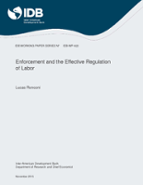Enforcement and the Effective Regulation of Labor
Date
Nov 2015
This paper provides new measures of labor law enforcement across the world. The constructed dataset shows that countries with more stringent de jure regulation tend to enforce less. While civil law countries tend to have more stringent de jure labor codes as predicted by legal origin theory, they enforce them less, suggesting a more nuanced version of legal origin theory. The paper further hypothesizes that in territories where Europeans pursued an extractive strategy, they created economies characterized by monopolies and exploitation of workers, which ultimately led to stringent labor laws in an attempt to buy social peace. Those laws, however, applied de facto only in firms and sectors with high rents and workers capable of mobilizing. Finally, it is shown that territories with higher European settler mortality presently have more stringent de jure labor regulations, lower overall labor inspection, and larger differences in effective regulation of bigger firms.




